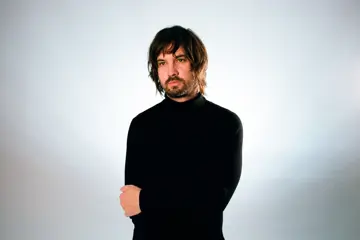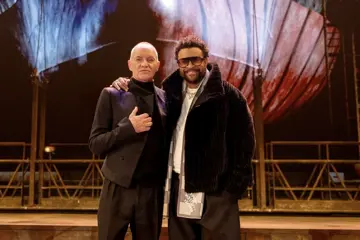 Oh Mercy
Oh MercyIf there is one thing you can't accuse Alexander Gow of being, it's unambitious. It can't have been an easy road to album number three – Deep Heat – having experienced making records solo, losing original member Thom Savage and expanding the Oh Mercy banner to something that now genuinely feels like a band, with the inclusion of Eliza Lam, Rohan Sforcina and Simon Okely. Yet, here he stands, only three years on from the release of his debut EP In The Nude For Love with his finest record release to date.
Deep Heat abandons the acoustic-based and confessional nature of Gow's music on the first two records – 2009's Privileged Woes and 2011's major label debut and acknowledged “breakthrough” Great Barrier Grief – and trades it for something brasher, something sexier and something with a deep groove, where basslines and sturdy drums dictate a classic swagger. This time, it's a different beast entirely.
“The birthing of Deep Heat, conceptually at least, came out of my realisation that people had managed to pigeonhole me as a serious, earnest singer/songwriter, which is fair enough considering the last record that I made,” Gow outlines thoughtfully. “But I'm not comfortable with the idea of being defined, you know, musically or even socially, so once I cottoned on that people had gotten comfortable with that idea of me as that type, I thought it'd be fun for me, subversive and interesting to throw them a curve ball and shake up their expectations a bit. That was the first and probably the most important realisation.”
Deep Heat is a record of vibrant and forward-thinking proportions. Not once does it feel over-thought or contrived, yet it takes Oh Mercy on an entirely fresh sonic path. Vocally, Gow is finer form than ever, yelping like a banshee on the likes of album highlight Pilgrim Blues and overall, spitting hormone-driven and fictional lyrics over a sound that has been crafted with producer Burke Reid. The influences are very present, though never derivative – My Man is a slinky Roxy Music-esque gem while the title track and pulsating bass-led first single Drums swagger on the right side of sexy arrogance and Still Making Me Pay takes on a direct reggae flavour.
Don't miss a beat with our FREE daily newsletter
“I had always loved '70s R&B and groove-based music and late-'70s glam rock and reggae and dub music,” says Gow. “So I figured I might access that palette of my appreciation of music. I feel I still write music in the method I always have, except that I knew that I was going to execute them differently and I knew I was going to be subtracting all the rhythm-playing – there's no one playing acoustic guitar, all the chords changes are implied by the bass guitar. So, yes, same old songwriting. So I do feel I've thrown the proverbial curveball.”
Following the completion duties for Great Barrier Grief, Gow decided he wanted to shake up the sound so he decamped to Portland, Oregon for a couple of months and set out to make the transformation with Read at the helm. His memories of the time are vivid. “I remember drinking mountains of beer,” he says, placing utmost importance on the alcohol. “It's really, really cheap over there. I remember riding ten kilometres every second day around Lake Oswego with Rowan. I remember drinking a tonne of coffee. I remember Law & Order: Special Victims Unit being constantly on repeat on American TV – I fell in love with a couple of the actresses, in and out a few times. I remember how excitable Burke was and his endless amount of fuel that his creativity continuously burns on. I remember talking to him and describing approaches with him and generally talking with our crotches, while thrusting at one and other to try and explain the kind of sax solo we wanted on the song. I remember when Burke shaved his beard off and looked about 12 years old. I remember writing and recording Deep Heat, the song, I wrote it the first day and recorded it the second day. I wrote it in the shower while Rowan was setting up the drums. I was upstairs in the shower and I could hear him playing that shuffle feel and I had always wanted to write a song with that feel and I did.”
For the first time, Gow put the personal musings aside and began to write in third person. It all started with a song called My Man which was written on the piano from the perspective of a woman, a little trick he wanted to try after reading a chapter in Paul Kelly's memoir How To Make Gravy. “Paul Kelly famously does that and does it better than anyone,” he says. “I thought that would be an interesting exercise in writing. So I wrote My Man, which is the third song on the record, and it was a whole bunch of fun and a lot easier than I expected. It paved the way for the rest of the album to be this fictional style of writing. I think the reason that it's easier is because when I don't have to be super-earnest and sincere and I am writing fictional work [so] I can access a wider palette of vocabulary and concepts. I can literally use words that I could never use if I was singing about myself – it made it really easy. That way, I'm not revealing anything – I've written a fictional record, it's more coward than previous attempts. In terms of being provocative, like the content of the words and aesthetic, I find that just really fun. It's fun to be that subversive and it's an Australian tradition. I don't have any hangups about that at all and will continue to do so until no one cares anymore.”
Some of the most obvious presences on Deep Heat are those of Gow's influences. Clearly stemming from the pop world, Gow is too young to have lived through the material he clearly adores, so how did he hear this music he seems to reference? “By just listening to music,” he says. “It's what I do and I investigate music and that's what excites me. My knowledge of music isn't as vast as some but it is vast. If you heard me doing an iPod DJ set at a house party, you would probably notice that I don't own many records past 1987 or something. I grew up listening to '60s pop groups and singers that I still love like Dusty Springfield, Nancy Sinatra, Dionne Warwick, Scott Walker, Lee Hazlewood – stuff like that. My love of pop music stemmed from all those and then I discovered all the songwriters. Hearing The Velvet Underground was a big deal, and all that combined, well, that opens up a lot of different avenues.”
Another big change to proceedings for Oh Mercy's record number three is that it was more of a band effort. In the past, Gow has decamped solo, teamed up with a crack team of musicians and producers and recorded that way. This time around, drummer Rohan Sforcina and bassist Eliza Lam tagged along for the ride and contributed heavily to not only the album's aesthetic, but also to Gow's time itself. “It was awesome!” he raves. “Rohan and Eliza have become a real asset to the band and to the sound. It was great; they really stepped up and, luckily for me, they're also my friends. Having that support and friendship was priceless. I did feel like it was more a gang or something going over there this time – you know, simple stuff like going for a run with Rohan. It's going to feel good to get on the stage with these guys who played on the record as well.”
Overall, Gow is a happy man or so it would seem. He talks about Deep Heat with immense pride, but when asked what he specifically and personally loves about it, he humbly answers with “the art” – the only part of the record he actually had nothing to do with. “I'm really happy about the artwork, I love Rennie Ellis, the photographer that took it – he's one of Australia's greatest and the fact that I can have one of his photos for my album cover is so exciting and pleasurable. I'm glad it has polarised opinions. It's bombastic and it's provocative and it's by one of my artistic heroes. So that's one of the things I am super proud of. In terms of the music, the song I'm most proud of writing is My Man. And my favourite song on the album is Still Making Me Pay, just audio-wise, I think it has a really interesting spectrum and it was as fun as it sounds to create.”
It's not only the sound and aesthetic that has changed for Oh Mercy, the band's live show itself has shifted the goal posts considerably. “Eliza has had to really step up, it's her record – the bass is the most prominent instrument on the whole thing,” Gow explains. “There's fuck all guitar on it which is good for me because I never really liked the guitar in my music. I'm not playing guitar anymore, I'm just singing. I'm going to do the frontguy thing – it could be sink or swim, we'll see how we go. I did it on the Finn Brothers show and then with The Triffids, that's given me the confidence to try it at least. But Annabell, our keyboard player, and Eliza are kind of the stars of the show, musically. It's going to be a whole new ball game.”















